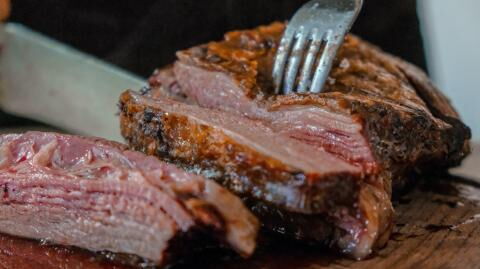Protein synthesis is your body's ability to absorb and utilise protein, and apparently it does have a limit. While your muscles do benefit from the nutrient, your body can only handle so much protein at once. Dr Doug Paddon-Jones, a professor of nutrition and metabolism at the University of Texas Medical Branch states:
Discover our latest podcast
Skeletal muscle protein synthesis is maximized by 25 to 35 grams of high-quality protein during a meal.
Protein synthesis allows your body to build and repair muscle. Essentially, the more exercise you do the more you inflict micro-tears on your muscle and it is protein's job to help that muscle heal as well as grow bigger and stronger.
However, if you have fewer than 25 grams of protein in your meals, muscle pains will only persist as the body does not have the building blocks to repair the damage. But, on the opposite end of the scale, if you consume more than 35 grams of protein then the excess doesn't get used. Instead, this excess protein rather gets wasted... down the toilet.
So, what does the magic 25-35 grams of protein look like in one sitting?

Perfect protein portion sizes
- 1 cup of cottage cheese has 28 grams of protein.
- 1 cup of greek yoghurt and a handful of nuts gives you the bare minimum of 25 grams.
- A palm-sized portion of steak, fish or chicken leaves you with a whopping 28 grams of protein.
- 3 whole eggs, as well as an additional 3 egg whites, give you 27 grams of protein.
- 1 scoop of whey-based protein powder is equal to 25 grams of protein.

So, maybe eating a steak the size of your face really isn't what's best for you after all. In fact, if you find yourself piling up your plate with too much protein then you could be pushing out room for other key nutrients from healthier sources such as fruit, vegetables and nuts that could also help repair and grow your muscle as well as supply your body with a multitude of other good things.
When is the best time to eat protein?
Also, you may want to slow down when you get home from the gym instead of rushing to the kitchen to eat that chicken and rice. Your body's elevated proteinsensitivity actually lasts 24 hours after a good session. One study conducted by McMaster University concluded that the body's elevated protein sensitivity could even last as much as 24-48 hours post-workout.
What matters more than when you eat protein is instead, how muchprotein you eat over a day. Rather than aiming for a nice round 60 grams of protein a day, it may be better to aim for 25-35 grams of protein 4 or more times a day. Make sure that one of these meals are about 1-2 hours before and after your workoutfor maximum benefits.















